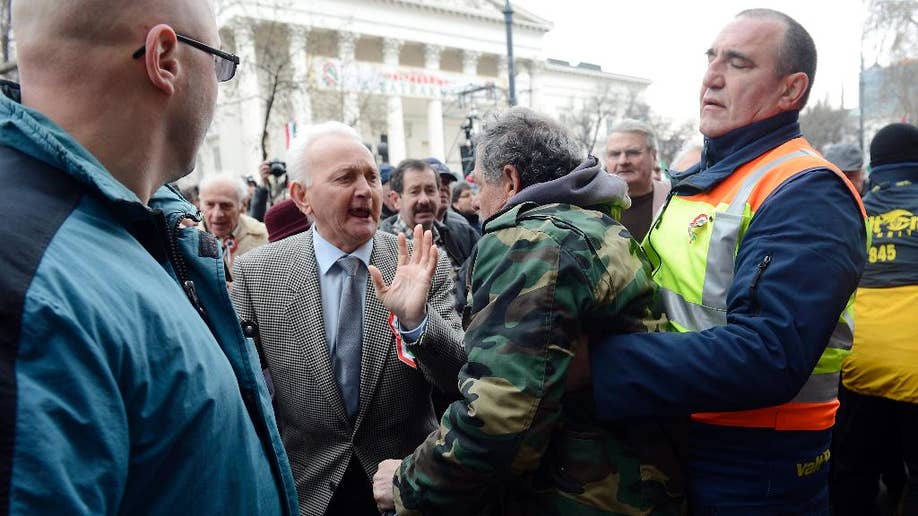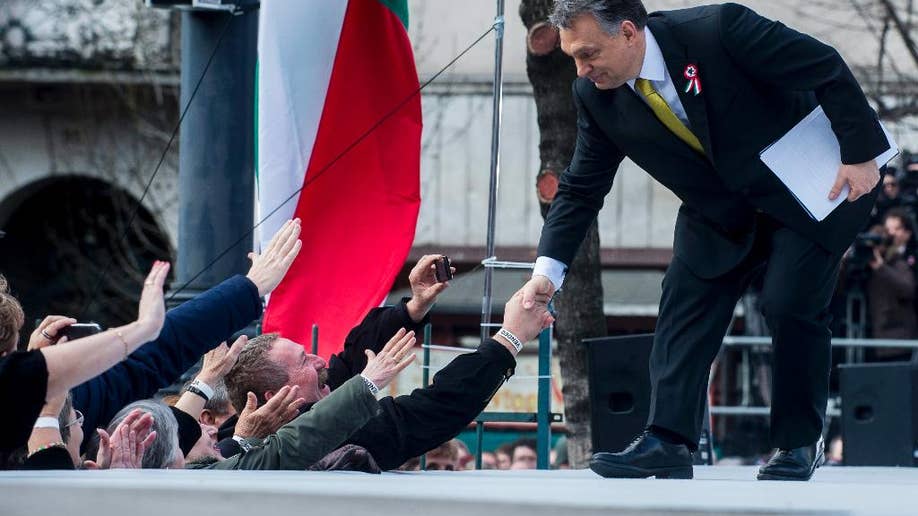Hungarian prime minister's supporters jostle with protesters at remembrance of 1848 uprising
{{#rendered}} {{/rendered}}Supporters of Hungary's prime minister jostled with a small group of protesters on Sunday during commemorations of the country's 1848 uprising against the Habsburg Empire.
Around 40 protesters holding up posters and jeering Viktor Orban and his government — accusing them of limiting civic rights — were confronted by some of the several thousand supporters listening to Orban's speech outside the National Museum.
Security personnel steered the protesters, some blowing whistles and horns, a few hundred yards away from the museum and their heckling was largely drowned out by chants of "Viktor! Viktor!" from government backers.
{{#rendered}} {{/rendered}}Orban, who has clashed with the European Union and the U.S. because of "unorthodox" policies like heavy taxes on foreign companies, crackdowns against civic groups and his vision for an "illiberal state," flaunted his contrarian ways.
"Europe is full of questions and Hungary is full of answers," Orban said.
Also on Sunday, organizers of a protest march which drew several thousand people announced they would seek to hold a referendum on several of Orban's most disputed policies to bring about a "new Hungarian republic."
{{#rendered}} {{/rendered}}Among the issues to be included in the referendum are the nationalization of assets managed by private pension funds, the recent expansion of road tolls and a plan to move the prime minister's office to Buda Castle.
"We want democracy and we want a common home with our Western European brethren," opposition lawmaker Zoltan Kesz told protesters. "Our allies are Europe and all of the world's democracies, not the eastern dictators."
Orban's latest conflict with the EU is over his deal last year with Russian President Vladimir Putin for the construction of new reactors for Hungary's only nuclear power plant. Russia is also giving Hungary a loan of 10 billion euros ($10.5 billion) to help cover costs.
{{#rendered}} {{/rendered}}Hungary has kept most of the plant's details secret for 30 years, but it was revealed Friday that the EU has concerns about the expanded plant's fuel supply, which would also be provided by Russia.
"We know well that the future is not defined by the curvature of the cucumber but by the bearing of the European man," Orban said, referring to a popular example of the EU's sometimes unnecessary regulations. "We are part of Europe and want to shape its future together with the other nations."
Orban also seemed to address the scuffles at the commemorative event.
{{#rendered}} {{/rendered}}"We are either going to be successful together, or not at all," Orban said. "We are going to expand the country or we will all suffocate in petty, provincial shoving."
Orban's Fidesz party won three elections last year, but a loss in a recent by-election ended its two-thirds parliamentary majority.


